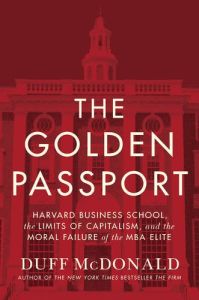Join getAbstract to access the summary!

Join getAbstract to access the summary!
Duff McDonald
The Golden Passport
Harvard Business School, the Limits of Capitalism, and the Moral Failure of the MBA Elite
HarperBusiness, 2017
What's inside?
Many managers at leading companies – but few great leaders – have graduated the Harvard Business School.
Recommendation
Business journalist Duff McDonald argues the Harvard Business School (HBS) strayed from its initial mission of producing graduates who both make money and make the world a better place. The problem he diagnoses is that its academic emphasis on efficiency and profit has produced too many graduates who manage only what they can measure. Management by measurement is a flawed approach to running an organization because it de-emphasizes immeasurable factors in success or failure. HBS grads at the helm of the US government, major banks and top consulting firms could not prevent the 2008 financial crisis. McDonald notes that HBS has reduced business management to a mathematical science while working to incorporate ethics in its curriculum. He finds that HBS’s focus on efficiency has, indeed, produced capable managers, but few great leaders. getAbstract suggests this comprehensive history to readers seeking an understanding of how HBS evolved.
Summary
About the Author
Duff McDonald wrote The Firm: The Story of McKinsey and Its Secret Influence on American Business and Last Man Standing, about Jamie Dimon, chair and CEO of JPMorgan Chase.


















Comment on this summary